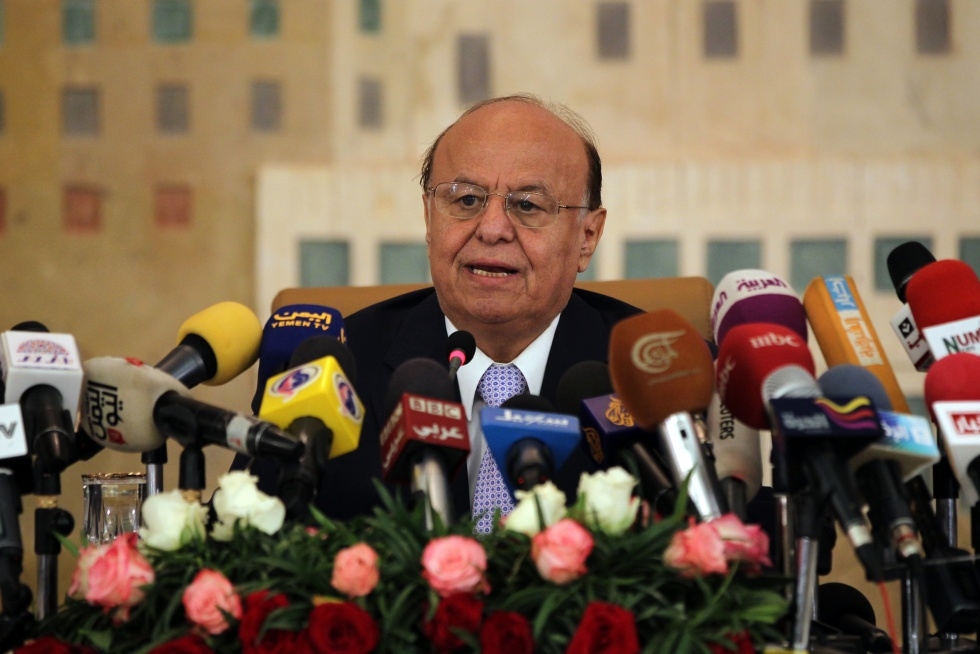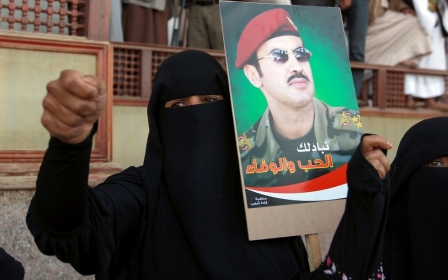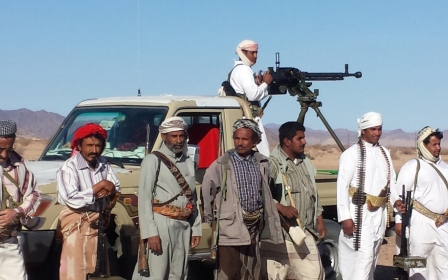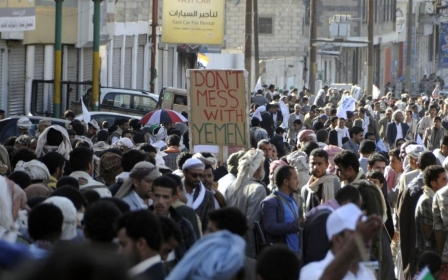Hadi faces stiff challenges as he tries to rule from Aden

AL-MUKALLA, Yemen - Yemeni President Abedrabbo Mansour Hadi has encountered a new obstacle as he endeavours to exercise his duties from his newly declared capital in the southern port city of Aden.
Hadi made a quick and unnoticed exit from Houthi-controlled Sanaa last month, arriving in Aden nearly a month after resigning following rebel assaults on the presidential palace and his house.
In a new test to his power, the chief of Special Security Forces (SSF) in Aden, Brigadier Abdulhafid al-Saggaf, rejected Hadi’s order to replace him with an army brigadier loyal to Hadi.
Local media reports said that Hadi sent him many delegations to convince him to quit, but with no success, stating that he would leave his post when Hadi appointed a person from the SSF and not from the army.
At the same time, al-Saggaf’s forces sporadically clashed with pro-Hadi armed popular committees that control the main airport, as well as Aden TV.
“This is a message from the Houthis that they have forces on the ground that would undermine Hadi’s power,” Fadhel al-Roubayee, a political analyst from Aden, told Middle East Eye (MEE).
Houthis from North Yemen have been predominantly in the political landscape of the troubled country since 21 September, when they swiftly gained control of military institutes in the capital and expanded their leverage into other provinces. Despite their quick advance in the north, the rebels have not approached territories in the south, where many still support the concept of an independent South Yemen.
Al-Roubayee said that Hadi has the power to dislodge the rebellious security chief from his position, but that he knows that the cost could be high.
“Hadi can execute his orders by hook or by crook but he knows that removing al-Saqqaf by force could trigger wider violence which could create justifications for the Houthis to advance into Aden.”
Since arriving in Aden, Hadi has received increasing diplomatic support from the neighbouring Gulf states, the US and the UK and other countries that are knee-deep in the political process of the country. At the same time, tens of thousands of people went to the streets in many cities, including Sanaa, to express their support for Hadi. Al-Roubayee suggests that Hadi should exploit international and public support to consolidate his “legitimacy”.
“Hadi can rule from Aden if he uses [resources] like the international community, support of some political parties and the southerners.”
Reconciliation
South Yemen has been the powerbase of the Southern Movement, an umbrella organisation for factions that seek the revival of the South Yemeni state that united with the north in 1990.
Pro-unity forces led by former president Ali Abdullah Saleh thwarted a secession bid in 1994 and subsequently laid off thousands of military and civil servants. The sacked forces came together in 2007 and sparked peaceful protests, demanding independence of the south.
Hadi was minister of defence when Saleh entered Aden, and pro-independence southerners staged massive rallies to oppose his ruling when he came to office in 2012.
Al-Roubayee said that Hadi is able to force the country off balance by bringing back those army officers to service.
“He should activate the outcomes of the national dialogue conference, which include reinstating thousands of army officers who were forced to retire after [the 19]94 civil war.”
This week, Hadi took an unexpected step towards breaking the ice with leaders of hardline factions of the Southern Movement. Hadi called separatists to two meetings in the presidential palace in Aden. On Monday, Hadi appeared talking to a group of separatists for the first time since the beginning of protests in the south in 2007.
Ali Haitham al-Ghouraib, a leading separatist figure who attended the meeting, told MEE that despite not agreeing with Hadi’s ideas in the meeting, he left the man with a good impression.
“We were delighted when he touched upon the point of reinstalling the military officers from the south,” al-Ghouraib said.
To tempt them to back him, Hadi told the separatists that those army and security officers would be reinstalled in military camps in the south, not in the north.
“Many southern officers were reluctant to return to their jobs since they were told that they would be sent to military camps in the north.”
In exchange, the separatists agreed to stop inciting people to protest against Hadi and his government. “Frankly, I was so pleased with the meeting. We agreed that our escalating revolutionary programme would not include any slogans against any southerners including Hadi.”
But some other activists say that Hadi has only paid “lip service” to their causes. Radfan al-Doubais, a TV presenter and a prominent figure in the Southern Movement who attended a previous meeting with Hadi, told MEE that the southern leaders suggested that Hadi assimilate the southern factions in his popular committees that partly control Aden.
“We proposed engaging all factions in the south in the committees so as to keep the south united and protected from conflicts. He has not taken any practical step towards that end. The popular committees should not be solely formed from Abyan." Hadi’s popular committees were formed in 2011 when the army collectively worked with them to drive al-Qaeda militants out of their strongholds in the Abyan and Shabwa provinces.
Former president threat
As Hadi consolidates his grip on power in the south, the country’s former strongman Ali Abdullah Saleh has accused him of collaborating with the separatists to divide the country.
For the first time since leaving office in late 2011, Saleh on Monday publicly lashed out at Hadi and the politicians who joined him in Aden. Differences between the two leaders came to the fore when the UN Security Council imposed sanctions on Saleh for derailing the political process in Yemen.
In a meeting with supporters from the province of Taiz, Saleh warned Hadi and other figures who allegedly support the breakup of the country that he would force them to flee from Aden through the Red Sea. In an apparent sign that he seeks a comeback, Saleh vowed to make a public speech on TV to disclose an important file.
“I have not appeared on TV to talk to the public, but I will do so [at] the right time to disclose facts and open files. Abd Rabbouh Mansour Hadi! Why did you not stick to your resignation that you willingly offered and stay honourably in Sanaa?”
Al-Roubayee thinks that Saleh seeks publicity and support that could pave the way for his return.
“By alarming the threat of secession and labelling Hadi as a separatist, Saleh wanted to lobby people behind him to make [a] comeback.”
Now, it appears that those forces that opposed Hadi’s power in the past are backing him with all guns blazing and vice versa.
New MEE newsletter: Jerusalem Dispatch
Sign up to get the latest insights and analysis on Israel-Palestine, alongside Turkey Unpacked and other MEE newsletters
Middle East Eye delivers independent and unrivalled coverage and analysis of the Middle East, North Africa and beyond. To learn more about republishing this content and the associated fees, please fill out this form. More about MEE can be found here.




